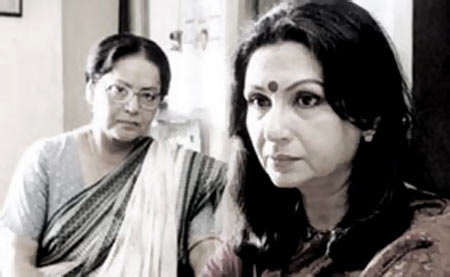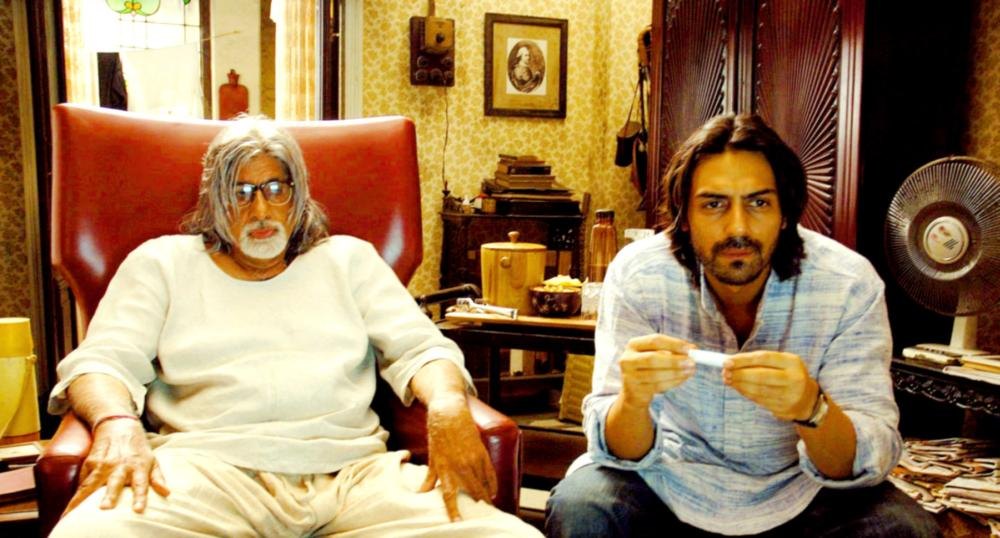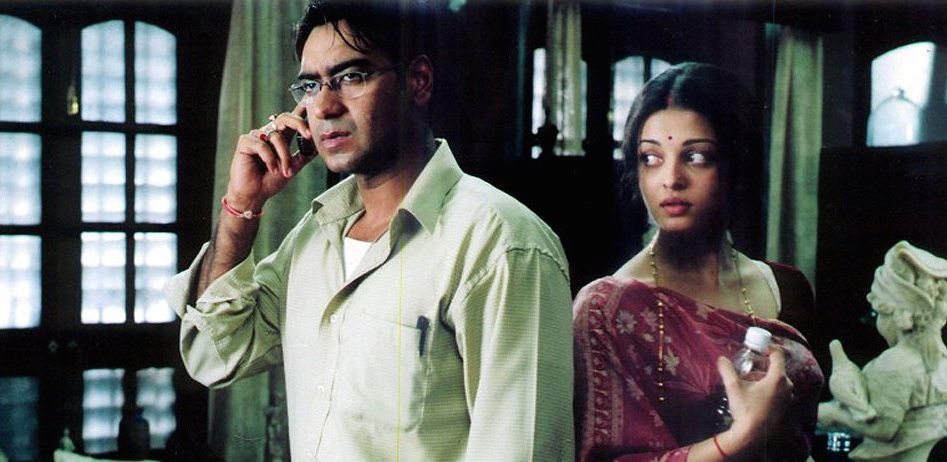The eastern state of Bengal has always been the cultural hub of India. Eminent writers, scholars, philosophers, painters, musicians and auteurs have constantly come out of this state and dazzled the world with their genius and creativity. When Satyajit Ray passed away in 1992, the future of Bengali cinema, which till then was a force to be reckoned with, looked bleak at best. Art house cinema had been Bengal’s stronghold over the decades and the flame would have been extinguished if not for the emergence of a diminutive man who expertly took over the reins which had till then been in the hands of Ray himself.
Before ‘Hirer Angti’ was released in 1992, Rituparno Ghosh, much like his idol Ray, worked as a creative artist at an advertising agency. 12 National and several International Awards speaks volumes of his unrivaled genius. He proved the vital link between the golden era and modern times with his cinema following the guidelines set by the legendary auteurs whilst being true to the times and in tune with the sentiments of a fast evolving society. 30th May, 2013 is a black letter day in the history of Indian cinema. A true artist was lost forever and no amount of mourning could bring him back. Without a shadow of doubt, he was the best director in recent memory. None has been so learned and passionate in his work. With that said, here is the list of top Rituparno Ghosh movies you must see.
10. Shubho Mahurat (2003)

Although renowned for his films on humanism and womanhood, Rituparno Ghosh had his fair share in the whodunit genre. ‘Shubho Mahurat’ is the finest of the lot. Adapted from Agatha Christie’s Miss Marple mystery, ‘The Mirror Cracked from Side to Side’, this film was the proof of the director’s versatility. It is remarkable how Rituporno adapted the classic English novel into a Bengali background. He managed to keep the tension throughout the movie and unveiled the clues on the way, keeping the audience taut in their seats till the moment of climax. He brought out the best out of his stellar cast, with veterans like Sharmila Tagore and Rakhee in the lead and newcomers in Nandita Das and Tota Roy Choudhury in the supporting roles. There are a few good thrillers in Indian cinema, and ‘Shubho Mahurat’ features among the top ones in the list.
9. Chokher Bali (2003)

Rituparno Ghosh had always been an ardent fan of Rabindranath Tagore. Hence a film out of the Great Poet’s works was always in the plan. ‘Chokher Bali’ was the first of the lot. Subtitled ‘A Passion Play’, the film dealt with the story of a young and beautiful widow, Binodini, as she tried to fulfil her desires in a patriarchal society which refused to acknowledge widows, let alone their sexual awakening. Tagore’s novel was a milestone in the path of feminism and Rituporno Ghosh took the subject as his own and dealt with it in his own brilliant manner. He managed to personify the characters beautifully on screen and recreated the erstwhile Bengal with huge mansions, lustful bourgeois class and general apathy towards widows. ‘Chokher Bali’ is also renowned for the marvelous detailing and set design which Rituporno Ghosh himself did. The lighting employed in the movie was something which made the modern directors sit up and take notice. The emotions in the game of lust were amplified by the low light and shadows, and every flicker of the lantern cast a huge shadow on the dilapidated walls, and the mystery lurking behind each of the players was highlighted. ‘Chokher Bali’ remains one of the finest character studies in Indian cinema till date.
8. Abohoman (2010)

The complexity of relationships and the concept of a muse for an artist was explored in this 2010 drama. Following the story of a director who sees his wife’s younger self in an aspiring young actress and falls in love with it, ‘Abohoman’ is a documentary on humanism and the fragilities of a seemingly well set human mind. Rituporno Ghosh told his tale on the silver screen with absolute panache, never really allowing us to hate the infidel Aniket, but filling our hearts with grief for Deepti, who never allows herself to be a silent spectator in this love story. She is the epitome of love as she confers the title of ‘Sritoma’ to the young Shikha to fulfil her husband’s musings. Aniket is the artist who is so enamored by his muse and his creation that he falls in love with them. The ending of ‘Abohoman’ is open to speculations that who actually was Aniket’s desire throughout. Rituporno dealt with the concept of marriage and musings at one go and delivered one of the finest dramas in recent memory. The National Awards it won were imminent. Mamta Shankar as Deepti and Ananya Chatterjee as Shikha put in the performances of a lifetime for this film, enabling Rituparno Ghosh’s genius to become a masterpiece.
7. Bariwali (2000)

In 2000, Rituparno Ghosh took up the story of a lonely owner of a mansion whose husband had died of snake bite the night before their wedding. The concept of infatuation to something or someone worldly in the mind of a loner is dealt with expertly through the life of Banolata. When a charming director Dipankar comes to shoot some scenes in one of the wings of the estate, she is drawn to him. Her feelings ultimately end up unanswered when the film unit leaves and her loneliness comes back to haunt once again, ending what had been a brief moment of sunshine on her otherwise dark and cloudy life. Emotionally powerful, ‘Bariwali’ is a take on feminism and spoke against the prejudices held against middle-aged women who seek solitude. Kirron Kher as Banolata and Chiranjeet as Dipankar were wonderful in their performances. Although Mamata Shankar was supposed to star as Banolata and many critics feel she could have done a better job, it’s a testimony to Rituporno’s brilliance that he brought out the best from mainstream actors.
6. The Last Lear (2007)

Rituparno Ghosh’s 2007 film on a legendary actor refusing to come to terms with modernism is based out of Utpal Dutt’s semiautobiographical play, ‘Aajker Shahjahan’. ‘The Last Lear’ starring Amitabh Bachchan in his finest performance till date pits the two eras together in a contest and is a journey of coming to terms. It is reminiscent of the transition the notable stage actors felt while foraying into the film industry. This film also deals with the dying art of theatre with the rapid popularity of the ‘bioscope’. Told using parallel story lines, it explores the character of veteran actor Harish Mishra as he prepares for his only on-screen performance. ‘The Last Lear’ is one of the most engaging films made by Rituparno and cemented his status as an expert on humanism. It won the National Award for the Best Film in English.
Read More: Hrishikesh Mukherjee Movies
5. Dahan (1997)

The ugly vice of molestation and society’s hypocritical stance to this heinous deed is dealt with in this 1997 drama. Rituporno Ghosh tells the story of Romita and Palash, who experience the black act on the streets, causing a breach in their relationship that was never quite repaired. ‘Dahan’ protests vehemently against the silent society which shows an anti-rape stand but never comes up when required. Only the school teacher Jhinuk came forward when the people were watching the deed. But she too was rebuffed by the in-laws when she tried to investigate. It showed the pangs of the victim and the mental insecurity of the husband who ended up raping his own wife. ‘Dahan’ dived deep into the complexities and darkness of the human soul and came up with astounding truths. Society is the criminal throughout and Ghosh managed to turn the silent streets of Calcutta into an evil ranch. Rituparna Sengupta as Romita and Indrani Halder as Jhinuk deliver stellar performances as they manage to uplift the message of womanhood to the masses.
4. Ashukh (1999)

In this 1999 film, Rituporno Ghosh looks into the divide between a father and a celebrity daughter as their mother succumbs to a mysterious illness. ‘Ashukh’ symbolizes the grief which illness brings to a family and questions its origins. The daughter’s rise to fame and the father’s egotistical nature which never allows him to live off his daughter’s earnings spawn the seeds of mistrust between the pair and the divide falls on the family. The illness is the result of this tension and falls on the mother who had spent her life holding the strings of the family. One of Rituporno Ghosh’s most underappreciated works, it is amazing how he managed to bring about that level of human psyche and emotion within the walls of a house holding three members. Soumitra Chatterjee and Debarshi Roy gives warm performances in their roles as father and daughter, enabling the audience to empathize with the sentiments of the duo.
3. Raincoat (2004)

No one could believe that O’ Henry’s classic story, ’The Gift of the Magi’ could be adapted in such a way. Melancholic and set in the back drop of a rainy afternoon in Calcutta, ‘Raincoat’ is all about one moment and the entire film revolved around that. That moment was quiet and poignant, never brusque or loud, silent yet meaningful. When broken lovers meet under duress, love turns its head in an amazing fashion, and speechless commits selfless acts which ‘The Gift of the Magi’ talked about – The Magi being the wisest men brought gifts of great value. Perhaps only someone as learned as Rituporno can understand the true meaning behind the saying and he proved it in ‘Raincoat’. Deglamorizing Aisjwarya Rai yet again after Chokher Bali, he brought about magic in a dilapidated Calcutta house where love overcame circumstances. Ajay Devgn proved his mettle as a character actor with this film.
2. Unishe April (1994)
Rituporno’s second film in 1994 dealt with the estranged mother-daughter relationship in an upper middle class family. A celebrity mother Sarojini who often neglected the upbringing of daughter Aditi leading her to be raised by her father Manish, faces the harsh truth of reality when her daughter confronts her on 19th April, the death anniversary of Manish. To receive a prestigious award for her performances, Sarojini was set to leave for Delhi. A cancelled flight brings her backs unexpectedly when Aditi was about to commit suicide after her boyfriend dumps him over the phone. A rainy evening and a prolonged power cut brings about the heartiest of conversations between a mother and daughter and unlocks two decades of grief and anguish. It was a mark of absolute brilliance and the way the conversation scene was contrasted with the opening moments where the constant telephone ringing was more of a distraction is surreal. ‘Unishe April’ is a document of humanism and brings out all emotions through conversations. Richard Linkelater’s Before Trilogy is highly reminiscent of this film. Aparna Sen and Debarshi Roy prove themselves as supreme actors. India had never seen a better film on conversations than this.
1. Utsab (2000)

Rituporno Ghosh’s millennial drama ‘Utsab’ is a complete film. The biggest festival of Bengal in an ancient zamindar house serves as the backdrop of this Rituparno Ghosh classic. Released in 2000, Utsab brings about the tensions amidst the joy of re union, uncovering a long buried secret and culminates on a positive note. The opening shots are those of the sprawling mansion and the finishing touches to the clay idol by Banshi, much like that of the Satyajit Roy cult film ‘Joy Baba Felunath’. The story is unparallel. The way Rituporno Ghosh handled the simple yet detailed plot is admirable. Showing the common troubles of a Bengali household amidst the pride of Bengal, the Durga Puja, Rituporno penned perfect script, offering clues along the way for unearthing the secrets and finally showing a way out of the crisis. He unveils the demons lurking behind everybody’s character slowly and uncovers the secret which the family had been trying to suppress over the years.
The superiority in direction is unquestionable. The shots were never monotonous and the audience got to feel along with so many different characters. The whimsicality of a financially weakened man was highlighted when Asit decides to turn to Sishir, a man whom he had kicked out. An ensemble cast deciding to get their acts right, acted as a catalyst to the film. Mamata Shankar was nothing less than outstanding in her stellar role, showing the pathos of taboo love and her grit in not letting the same affect the lives of Joy and Shampa. Prasenjit stole the show as the independent alcoholic, yet caring husband. Arpita and Ratul were charming as the young in love couple. Rituparna bagged yet another feather in her cap as the troubled Keya.To cap it all were the stellar performances by Bodhisattva Mazumder and Madhabi Mukherjee, showing a resolute reassuring presence in the unfolding crisis. ‘Utsab’ the magnum opus in Rituporno’s collection of gold.
Read More: Mani Ratnam Movies



You must be logged in to post a comment.